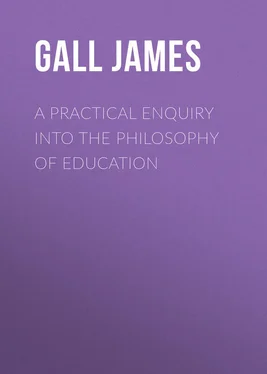James Gall - A Practical Enquiry into the Philosophy of Education
Здесь есть возможность читать онлайн «James Gall - A Practical Enquiry into the Philosophy of Education» — ознакомительный отрывок электронной книги совершенно бесплатно, а после прочтения отрывка купить полную версию. В некоторых случаях можно слушать аудио, скачать через торрент в формате fb2 и присутствует краткое содержание. Жанр: foreign_detective, foreign_antique, foreign_prose, на английском языке. Описание произведения, (предисловие) а так же отзывы посетителей доступны на портале библиотеки ЛибКат.
- Название:A Practical Enquiry into the Philosophy of Education
- Автор:
- Жанр:
- Год:неизвестен
- ISBN:нет данных
- Рейтинг книги:3 / 5. Голосов: 1
-
Избранное:Добавить в избранное
- Отзывы:
-
Ваша оценка:
- 60
- 1
- 2
- 3
- 4
- 5
A Practical Enquiry into the Philosophy of Education: краткое содержание, описание и аннотация
Предлагаем к чтению аннотацию, описание, краткое содержание или предисловие (зависит от того, что написал сам автор книги «A Practical Enquiry into the Philosophy of Education»). Если вы не нашли необходимую информацию о книге — напишите в комментариях, мы постараемся отыскать её.
A Practical Enquiry into the Philosophy of Education — читать онлайн ознакомительный отрывок
Ниже представлен текст книги, разбитый по страницам. Система сохранения места последней прочитанной страницы, позволяет с удобством читать онлайн бесплатно книгу «A Practical Enquiry into the Philosophy of Education», без необходимости каждый раз заново искать на чём Вы остановились. Поставьте закладку, и сможете в любой момент перейти на страницу, на которой закончили чтение.
Интервал:
Закладка:
To illustrate this point, let us suppose a child introduced to the bustle and sports of a common fair. Here he sees thousands both of familiar and strange objects, all of which are calculated to excite his mind to increased attention; and yet the child, while greatly amused, is still perfectly at his ease. There is not the slightest indication of his being incommoded by the numerous objects about him; no confusion of ideas, no distraction of mind, no mental distress of any kind; but, on the contrary, in the midst of so much to see and to learn, the young looker-on is not only at his ease, but appears to be delighted. The reason of this is, that he is not by any external force compelled to attend to all that he sees; and Nature within directs him to attend to no more than he is able to group, or reiterate in his thoughts. We shall endeavour to examine this condition of the child's mind in such circumstances a little more particularly.
The child in the circumstances supposed, must either be a spectator in general, or an examiner in particular; in other words, he must either employ himself with the principle of combination or grouping, or with the principle of individuation, – but he never attempts to employ himself with both at the same time. If he amuses himself as an observer in general, he is engaged in grouping objects which are already familiar to him; but while he is so engaged, he never directs his attention to any one unknown object for the purpose of examining it for the first time by itself. He passes over all the minute and unknown objects with a glance, and attends only to the grouping or associating of those which are already familiar. Nature induces him, while thus employed, to pass by all these minute and unknown objects; because, if he were to do otherwise, his observation in general would instantly be recalled, and his whole attention would be monopolized by the object which he had resolved to examine, to the exclusion of every other for the time. This, however, is not what he seeks; and he employs himself entirely in the grouping of things which are already known. His mind is left at ease, and in the possession of all its powers; he looks only at those things which please him; and he passes over all the others without effort or difficulty.
But if the boy shall come to something strange and new, which he is desirous of studying more closely, he immediately becomes an examiner in particular; but, at the same moment, he ceases to be an observer in general. The extended business of the fair, and the several groupings of which it is composed, are lost sight of for the moment; – the principle of individuation begins to act, and the operation of the principle of association, or grouping, is at the same moment brought to a stand. The two are incompatible, and cannot act together; and therefore Nature never allows the one to interfere with the other.
To shew the evil effects of overlooking this important law of Nature in the education of a child, we have only to attend to the painful results which would be the consequence of acting contrary to it, even in the vigorous mind of an adult. Let us for this purpose suppose a person of a powerful understanding, and a capacious mind, ushered for the first time, and for only five minutes into a crowded apartment in some eastern caravansary, or eastern bazaar, in which every thing to him was new and strange; and let us also suppose that it was imperatively demanded of him, that he should, in that short space of time, make himself acquainted with all that was going on, and be able, on his retiring, minutely to describe all that he saw. The first moment he entered, and the first strange object that caught his eye, would convince him that the thing was impossible . If, without such a demand, he had been introduced into such a place, and had seen various groups of strange persons differently employed, each engaged in a manner altogether new to him, and the nature of which was wholly unknown, he might look on with perfect composure, and considerable amusement, because he could attend, like the boy in the fair, either to the general mass, to isolated groups, or to individual things. He would in that case attend to no more than he was able to understand; and would placidly allow the other parts of the scene to pass without any particular attention. But the imperative injunction here supposed, – this pressure from without, – this artificial and unnatural demand upon him, – entirely alters the case. If he even attempted to make himself master of all the particulars of the scene in a circumscribed portion of time, he would find himself bewildered and confounded. The very attempt to individualize and to group so many various objects at the same moment, within such a limited period, would be enough to prostrate all the powers of his mind. He might perhaps be able to observe the persons and their costume, because varieties of persons and dresses are daily and constantly objects of observation, and are grouped without difficulty; but of their several employments, of which he was previously ignorant, he could know nothing, and on retiring, he would neither be able to remember nor to describe them. In such an experiment, it would be found, that the more anxious he was to perfect his task and to answer the demand, in the same proportion would he find himself harassed and distressed, and the powers of his mind overstretched and weakened. And if this would be the result of confounding the principles of individuation and grouping in an adult, – a person of good understanding, and of vigorous mind, – how much more hurtful must such a task be, when demanded from children or youths of ordinary capacity, during their attendance at school!
Few we believe will doubt the general accuracy of the above results in the cases supposed; – but some may perhaps question, whether they really do arise from the interference of these two antagonist principles during the experiment. To shew that this is the real cause of the distress felt, and the weakness and prostration of mind produced during it, we have only to institute another experiment which is exactly parallel. Let us suppose the same person, and for the same limited period, ushered into the traveller's room in a well frequented hotel, and let us also suppose, that the very same demand is made imperative, that he shall observe, and again detail when he retires, all that he sees. Let us also suppose, that the number of persons here is equally great, and that their employments are all equally diversified, but that each is familiar to him; and we will at once see that the difficulty of the task is really as nothing. A child could accomplish it. His eye would be able to group the whole in an instant, without effort, and without fatigue. If he saw one party at supper, another at tea, another group at cards, and others amusing themselves at draughts and backgammon; one minute instead of five, would be quite enough to make him master of the whole. On retiring, he would be able to tell the employment of every group in the room; and if any of his acquaintances had made part of the number, he would be able to tell who they were, where they were sitting, and how they were occupied. In doing all this he would find no difficulty; and yet the knowledge he has received is entirely new, and so extensive, that it would take at least ten fold more time to rehearse it, than it took to acquire it. The entire scene also would be permanently imprinted by the imagination upon the memory; and the whole, or any part of it, could be recalled, and reviewed, and rehearsed, at any future period. Here then are two cases, precisely similar in their nature, and undertaken by the very same person, where the results are widely different; and we now see, that the difference arises entirely from the principle of individuation having prepared the way in the one case, while it was not allowed to operate in the other.
Читать дальшеИнтервал:
Закладка:
Похожие книги на «A Practical Enquiry into the Philosophy of Education»
Представляем Вашему вниманию похожие книги на «A Practical Enquiry into the Philosophy of Education» списком для выбора. Мы отобрали схожую по названию и смыслу литературу в надежде предоставить читателям больше вариантов отыскать новые, интересные, ещё непрочитанные произведения.
Обсуждение, отзывы о книге «A Practical Enquiry into the Philosophy of Education» и просто собственные мнения читателей. Оставьте ваши комментарии, напишите, что Вы думаете о произведении, его смысле или главных героях. Укажите что конкретно понравилось, а что нет, и почему Вы так считаете.










